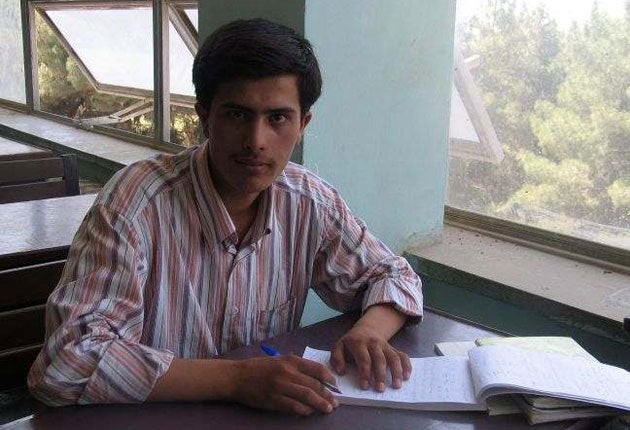New evidence 'proves' that Pervez should be released
Iranian says he wrote the words that condemned Afghan student to a 20-year prison sentence

Your support helps us to tell the story
From reproductive rights to climate change to Big Tech, The Independent is on the ground when the story is developing. Whether it's investigating the financials of Elon Musk's pro-Trump PAC or producing our latest documentary, 'The A Word', which shines a light on the American women fighting for reproductive rights, we know how important it is to parse out the facts from the messaging.
At such a critical moment in US history, we need reporters on the ground. Your donation allows us to keep sending journalists to speak to both sides of the story.
The Independent is trusted by Americans across the entire political spectrum. And unlike many other quality news outlets, we choose not to lock Americans out of our reporting and analysis with paywalls. We believe quality journalism should be available to everyone, paid for by those who can afford it.
Your support makes all the difference.New evidence has emerged in defence of Sayed Pervez Kambaksh, the Afghan student journalist convicted of blasphemy, which his lawyers hope could help free him from a 20-year sentence in one of Kabul's most notorious prisons.
The 24-year-old student was convicted after downloading an essay which questioned Islam's treatment of women, with prosecutors pinning their case on claims he wrote part of the text himself. Now The Independent has tracked down the real author of the essay and the man behind the website where it was first published, who have both insisted the material was theirs.
In an exclusive interview, Arash, an Iranian émigré now living in Europe, refuted key prosecution claims over who wrote what. "I have no doubt these words and these ideas came from my essays," he said.
Arash's eight-page article, entitled "Misogynistic Verses of the Koran", was first published, in Persian, on a website run by Nima Fahimi, an Iranian refugee living in Manchester. Mr Kambaksh was charged with adding four paragraphs of his own. But Arash has picked through the sentences the Afghan student has been accused of writing, and sourced them to earlier articles on his and similar sites.
The 25-year-old Iranian, who uses a pen name for protection, said: "The things Pervez was accused of writing are the central ideas of my essays. Anyone who has been on these websites and read the articles can see that... The words are the same or very similar to essays and pages we have on our websites." Neither Arash nor Mr Fahimi were approached by Afghan investigators, who Mr Kambaksh claims tortured him into signing a confession.
The case sparked protests inside Afghanistan, and around the world, after it emerged that Mr Kambaksh was convicted in a closed court without access to a defence lawyer. More than 100,000 readers signed an Independent petition demanding justice.
Since then, the case against him has crumbled. The original death sentence was commuted to 20 years, after a key prosecution witness claimed he had been forced to testify at the earlier trial on pain of death. In a court transcript, Mr Kambaksh is accused of "regularly asking his professors improper and irrelevant questions about the rights of woman in Islam".
The only other evidence against him was a text message, allegedly sent from his mobile phone, about sex in the afterlife. It is a well-known Afghan joke. A dead woman appears to her daughter in a dream urging her to relish life's pleasures because the only men in heaven are martyred and disabled.
However, last week Afghanistan's Supreme Court upheld his conviction in secret, without hearing his defence. And Mr Kambaksh's lawyer, Afzal Nooristani, says evidence has played little part in the legal proceedings. He said the latest testimony about the origins of the essay could help return the case to court, or even convince the Afghan President, Hamid Karzai, to issue a pardon. However, political analysts doubt that Mr Karzai would have the courage to pardon Mr Kambaksh ahead of an election, as it risks enraging hard-line Islamists.
John Dempsey, a lawyer in charge of the United States Institute of Peace, in Kabul, said: "In a country that upholds the rule of law this would have been thrown out, on procedural and substantive grounds, and Pervez would have been set free long ago."
Arash's essay on women's rights looks at verses in the Koran which deal with polygamy, inheritance, slavery, women's rights as witnesses, and the Prophet Mohamed's marriages. Mr Fahimi said his website, which means Revealer, is dedicated to rational and secular analysis. Both he and Arash urged Mr Karzai to pardon Mr Kambaksh. "Criticising religion shouldn't be a crime," said Arash. "After all the blood that's been shed fighting the Taliban, you would hope for a more tolerant system in Afghanistan; a system that respects free speech and free thought. This is like the Dark Ages."
Join our commenting forum
Join thought-provoking conversations, follow other Independent readers and see their replies
Comments